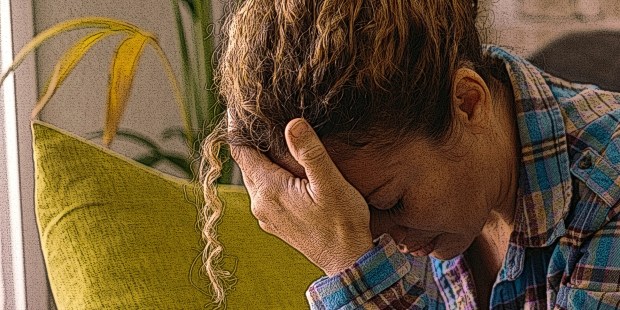Lenten Campaign 2025
This content is free of charge, as are all our articles.
Support us with a donation that is tax-deductible and enable us to continue to reach millions of readers.
As a priest, people often ask me for advice on getting their emotions under control. Anxiety that won’t go away, anger that flares up at the least provocation, sadness that won’t go away ... they don’t want to be anxious or angry or sad but can’t seem to help it.
Disregulated emotions can dominate us. They’re dauntingly difficult to overcome, so we’re prone to give in to them. We throw up our hands and essentially accept the mantra to Follow Your Heart. It’s a surrender to our emotional whims because there’s no use trying to be reasonable. The end result is a lot of hurt, unreasonable behavior, and regret. Emotions are fickle and not a good guide to making decisions.
Although the modern era has made an art-form of justifying our emotional captivity, it isn’t a new problem. Take, for instance, Romeo and Juliet. There’s a misconception that these two are tragic heroes, examples of passionate lovers betrayed by a cruel world. The truth is quite the opposite. Romeo and Juliet are the villains. Or at least, their immature, out-of-control emotions are the villain. They lurch wildly through a series of unwise decisions -- betrayal of family, fighting and violence, and eventually a despair so deeply felt that it destroys their very lives. It’s not true love they share but, rather, “violent delights” that “have violent ends.”

The danger of uncontrolled emotions
Shakespeare isn’t exaggerating. I’ve seen relationships fall to pieces because of uncontrolled anger. I’ve seen people fail to achieve their potential because of anxiety. I’ve been asked for advice which has been received warmly and then promptly discarded because, even if the advice makes sense, the emotions of the one receiving it didn’t allow them to follow it.
“Every inordinate affection,” observes St. Augustine, becomes a form of “its own punishment.” Emotions are a topic he knows a lot about. His entire Confessions is one long examination of how youthful emotions had destroyed his life. (Like Shakespeare, I’m not exaggerating. Check out a previous essay of mine about how he broke his poor mother’s heart.) He eventually did figure it out, realizing, as he says to God, “darkened affections is removal from Thee.”
If we follow our hearts no matter the circumstances, we end up emotionally attached to all sorts of things – good and bad, often unreasonable – which pull us in different directions. We become lost, far from God and even our own selves. I always think of St. Paul’s despairing statement, “What I want to do I do not do, but what I hate I do.”

Addressing the problem
I used to be in the grip of melancholy, which made me prone to isolation and despair. Feeling powerless to change, I gave in. I surrendered and even wallowed in the emotion. I convinced myself it was tragically romantic to be melancholic. Of course, I was a mess. Eventually I figured out how to address my unregulated emotion (I talk about this in my book The Forgotten Language). I firmly believe that God saved me and helped me get my sadness under control, but I also put in a lot of hard work. God offered a path forward, but I had to take the steps myself.
This personal experience and the writing of St. Augustine form the basis of my advice today when people ask me how to get control of their own emotions.
Practice
St. Augustine actually taught himself a new set of emotional responses. He was emotionally attached to the wrong sort of things, like lust and vanity, which had mastered him. But he wanted his reason to guide him to love good things and not be trapped by disordered emotional desires, so he set to work. For example, he read a book by Cicero that contained exhortations to self-control and the pursuit of wisdom. He says, “this book altered my affections ... and made me have other purposes and desires.” He intentionally formed an attraction to virtue, goodness, and reason. Eventually, he re-formed his emotions and began to want those good things.
How often do we practice loving all the wrong sort of things? We take in bad examples of unregulated emotions through reality television, social media, gossip, and trashy music. It’s like training ourselves to binge on junk food. When actual, nutritious food is offered, it has become distasteful. We reject it for an energy drink and candy. Is it any wonder we’re emotionally unhealthy?
To gain control of unhealthy emotions, we have to practice immersing ourselves in good examples and learning to love those good examples. It takes time, but with persistence it really does work.
Remember real happiness
Even though Augustine was beginning to desire the good, he wasn’t quite ready yet to completely change, famously telling God, “Give me chastity and continency, only not yet.” His next step was to delve into his memory. He practiced remembering his happiest moments, how he felt and why. Often, we trick ourselves, thinking if we give in to just one more impulse, we’ll finally be happy. (If I just yell at him, I’ll feel better. If I just follow my heart, I’ll finally be fulfilled.) If we search our memory, however, the times we’re actually happy aren’t what we thought. For instance, my happiest moments have been with family and friends, and I remind myself of this when my melancholy returns and I’m tempted to wallow in isolation.
“Memory contains also the affections of my mind,” says Augustine. When tempted to indulge out-of-control emotion, we can return to memories of true happiness in order to regain control. Basically, it’s a way of cutting off negative thought spirals. Focus on memories of how life is better when emotions are under control.
Let reason lead
Re-training emotional responses allows us to process information reasonably. We should always give ourselves time and space to act according to reason, not emotional whims. This doesn’t mean that emotions have no role -- that isn’t possible or even desirable -- but it means that emotions are led by reason. As Augustine says, the emotions become “governed.” For him, this meant his old emotional attachments to carnal pleasures were minimized. He began thinking more reasonably about what love really is, what it means to love, and what kind of man he wanted to be.
With the example of St. Augustine and lots of practice, it is possible to become healthier emotionally and to begin to act more in accord with our reason. It takes some discipline, but in the end, putting emotions in their proper place is the key to happiness.










